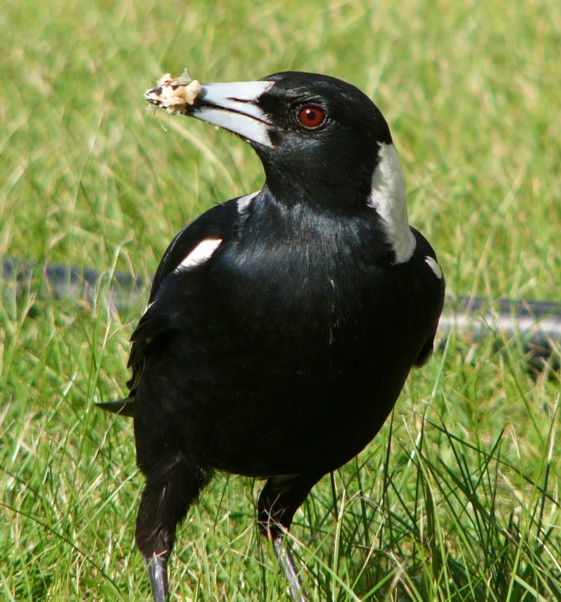|
| Query: australian magpie | Result: 13th of 122 | |
Australian magpie and lunch
| Subject: | Australian magpie and lunch
| | Poster: | The Nottles (beluga@centralonline.com.au)
| |

| Resolution: 561x602
File Size: 107690 Bytes
Date: 2004:10:07 07:31:43
Camera: DMC-FZ10 (Panasonic)
F number: f/4.0
Exposure: 10/3200 sec
Focal Length: 545/10
Upload Date: 2004:11:28 00:32:38
|
Gathering a beak full for the baby.....
Date: Wed, 24 Nov 2004 11:10:35 +1030
|
Comments |
|---|
| | Guest |
|
Australian Magpie (Gymnorhina tibicen)

(Source: NatureBase - http://www.calm.wa.gov.au/)
Sweet-voiced magpies are the black and white minstrels of Australia. They have adapted successfully to urban and agricultural areas. Beautiful carolling, a relish for eating many harmful insect pests and the bird's bold nature have made the magpie popular with the suburban gardener and other bird lovers. Australian magpies are often found in relatively open gardens, and sometimes become quite tame in suburban areas.
DESCRIPTION: These medium-sized birds are easily recognised by their black and white colouring. Adult males in WA have a pure white back. The powerful and relatively long bills are greyish-white with a black tip. The eye is reddish-brown and the feet are black.
OTHER NAMES: Western magpie, kulbardi (Nyoongar name).
STATUS AND DISTRIBUTION: Magpies are common and widely distributed through most of Australia, especially around farmland and urban areas.
PREFERRED HABITAT: They require eucalypt woodlands with tall trees for nesting and shelter, and open areas for feeding.
LIFE HISTORY: Magpies feed mainly on small insects and other animals that live in or just under the ground, such as worms, beetles, ants, spiders, frogs, lizards and even carrion. Magpies have a complex social structure. They form two main associations - tribes and flocks. Tribes consist of two to 10 birds of both sexes, which occupy a territory of up to eight hectares. They vigorously defend this breeding and feeding area against other magpies. Flocks consist of young adults and older birds unable to form a tribe or gain access to a territory. Magpies prefer to nest in tall trees. During the nesting season between August and October, after the chicks have hatched, both male and female magpies often vigorously defend the nest by swooping and diving at potential intruders. Care should be taken not to approach nest sites during this short period.
CALL: The loud, flute-like carolling call is a feature of our bushland and gardens. Like willie wagtails, magpies can sometimes be heard on bright moonlit nights. |
^o^
Animal Pictures Archive for smart phones
^o^
|
|
|

